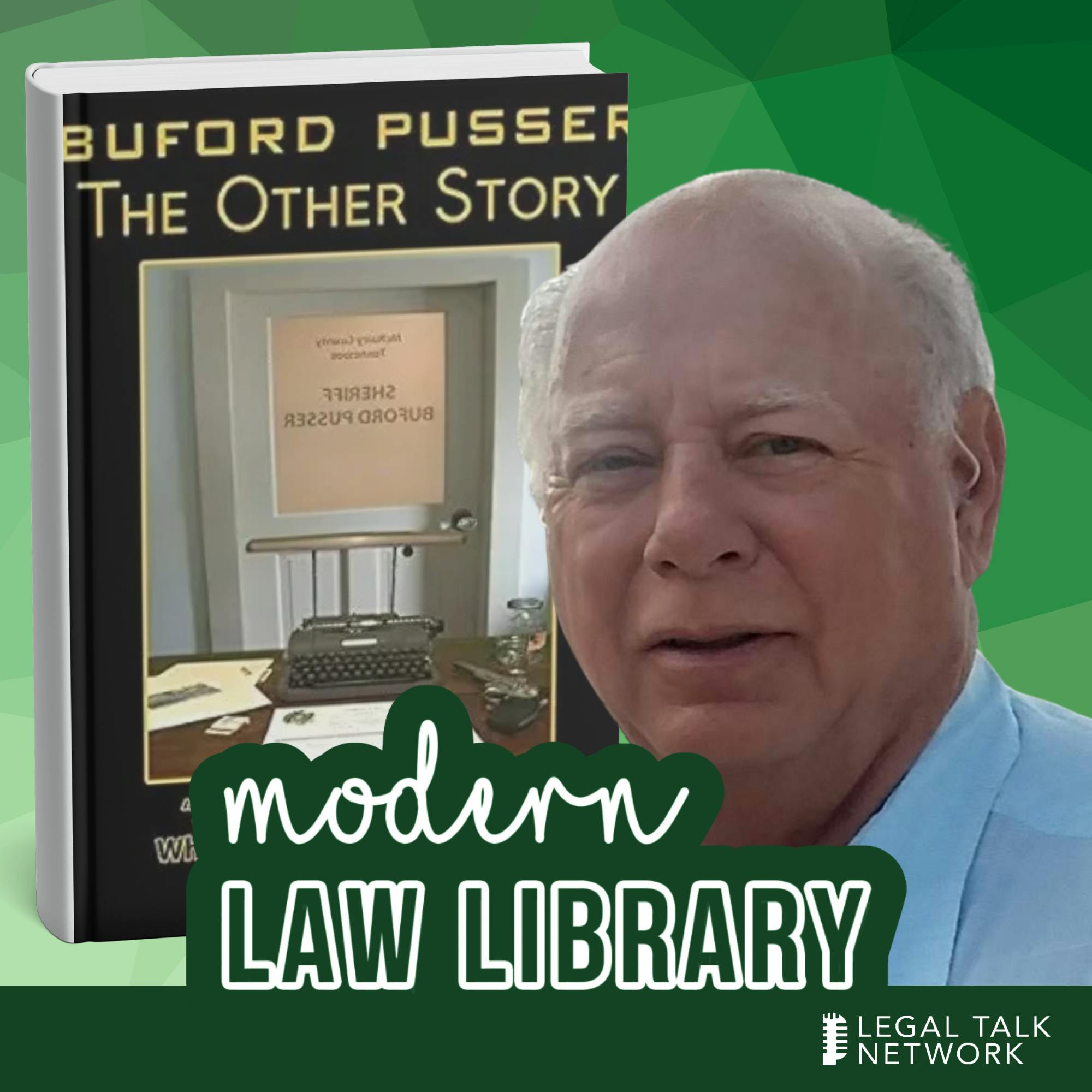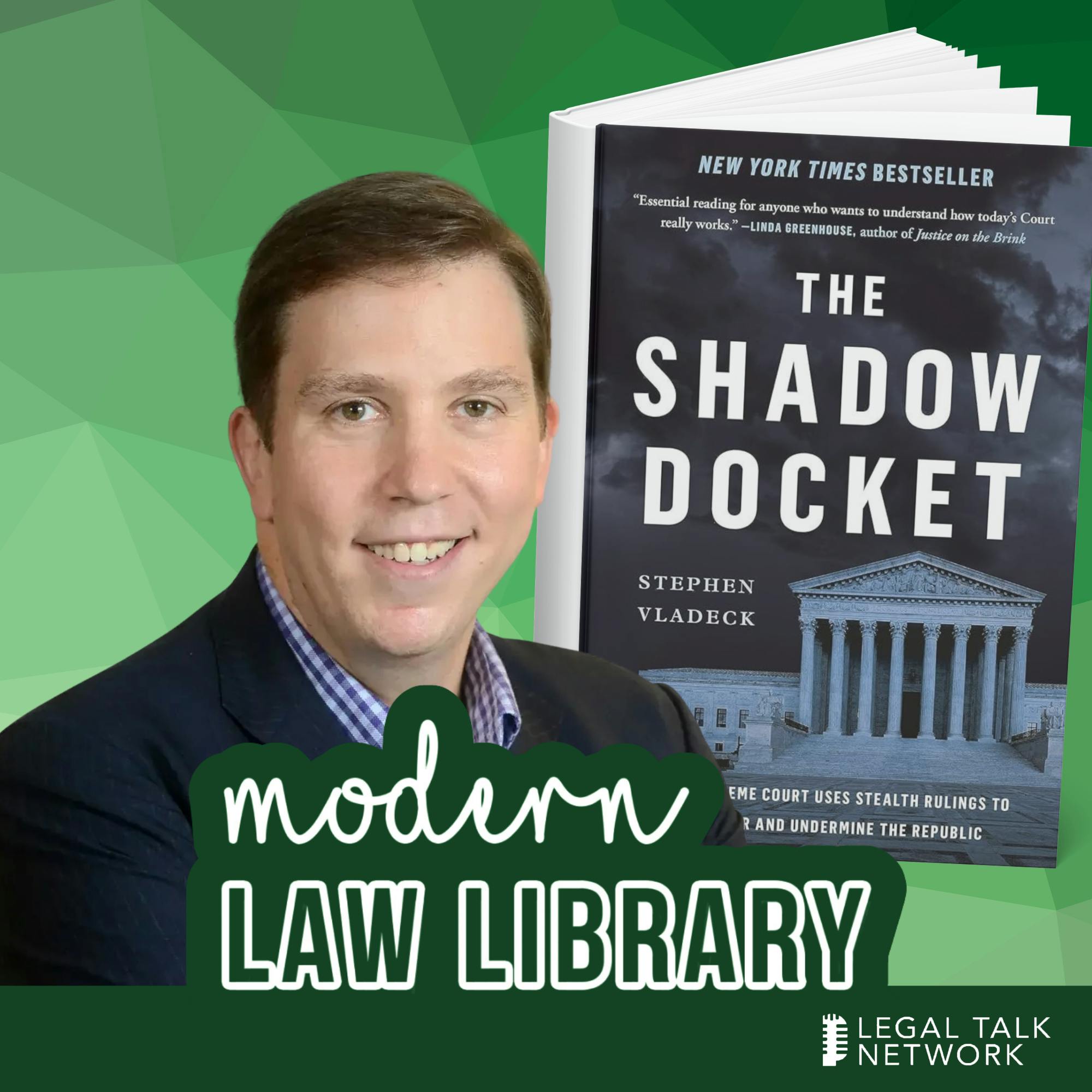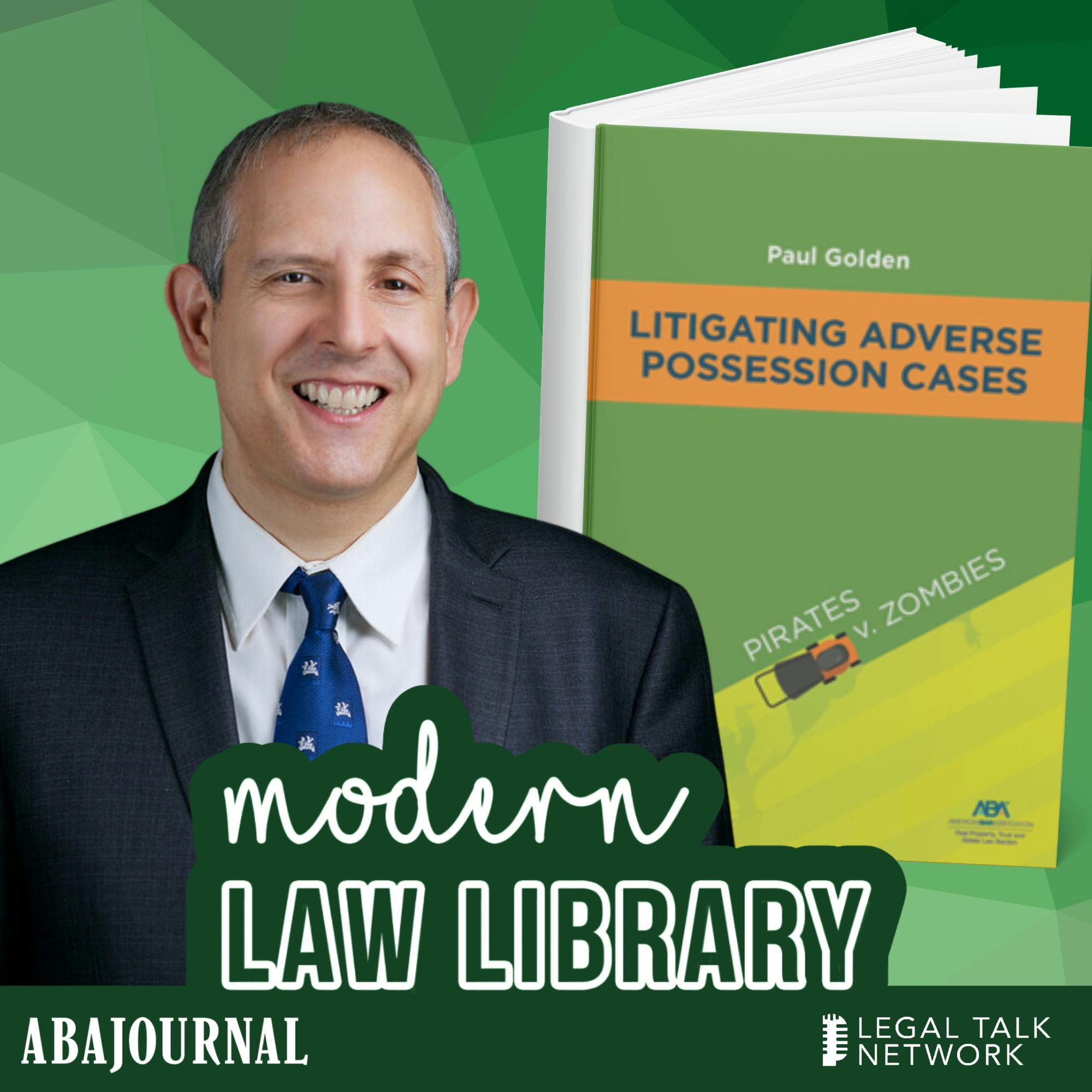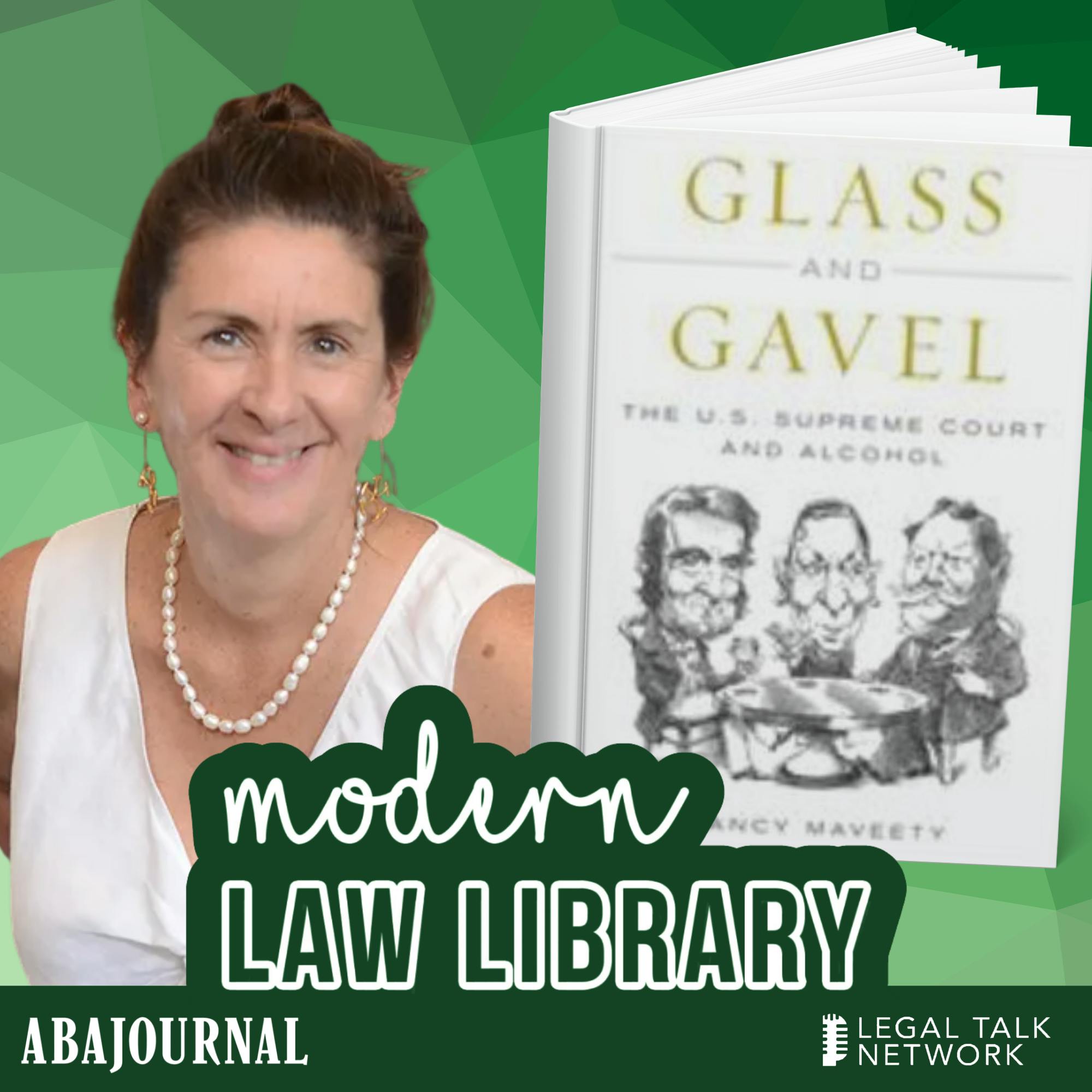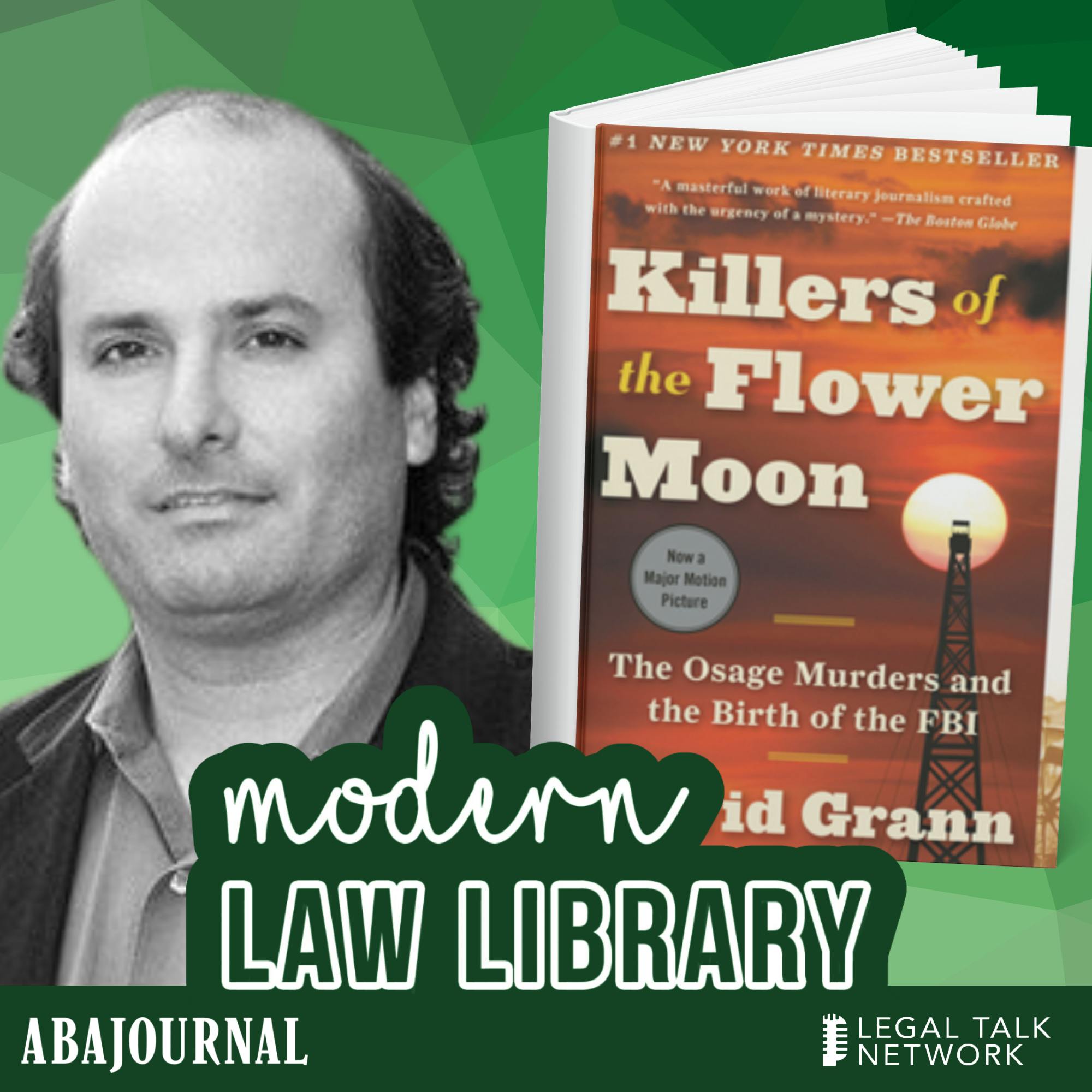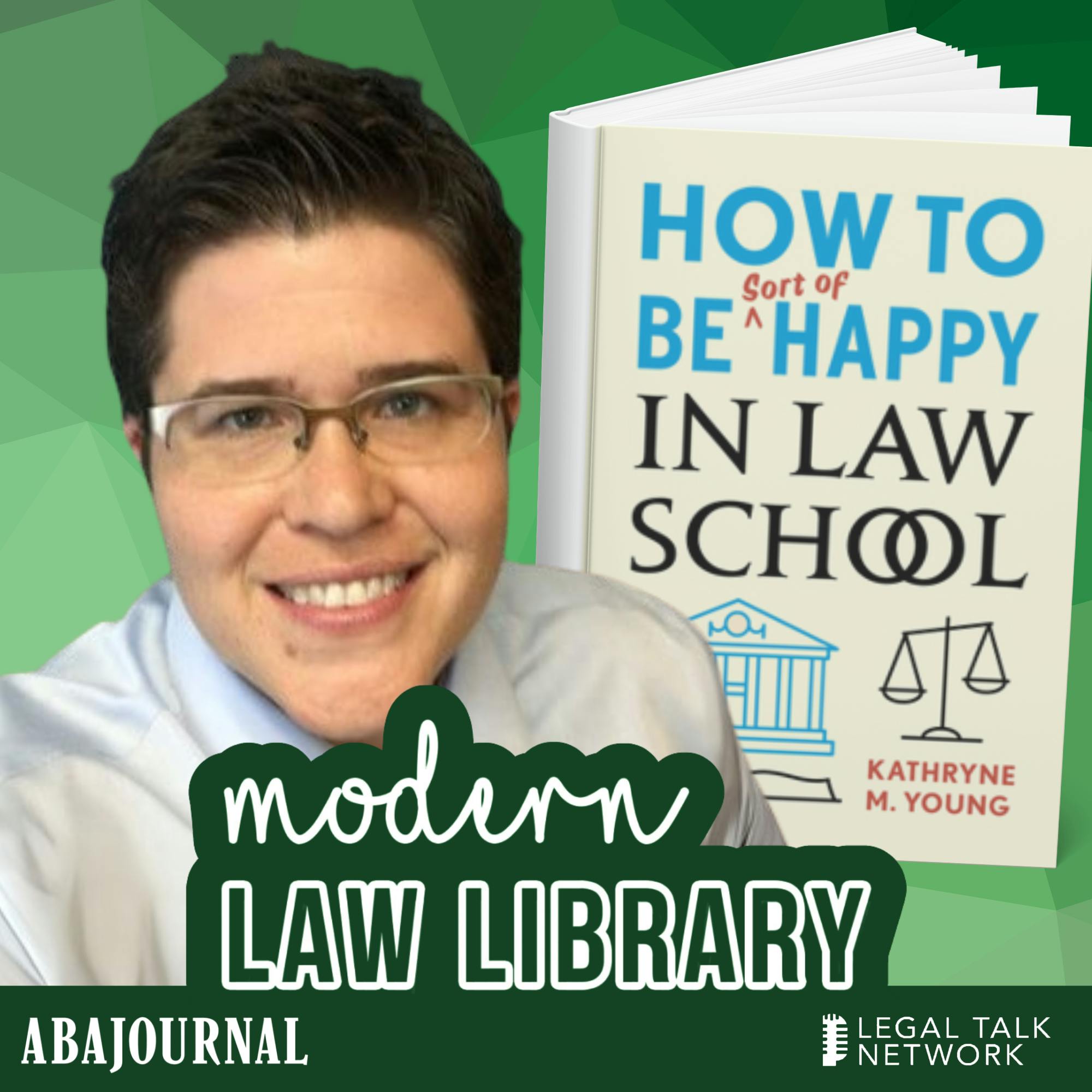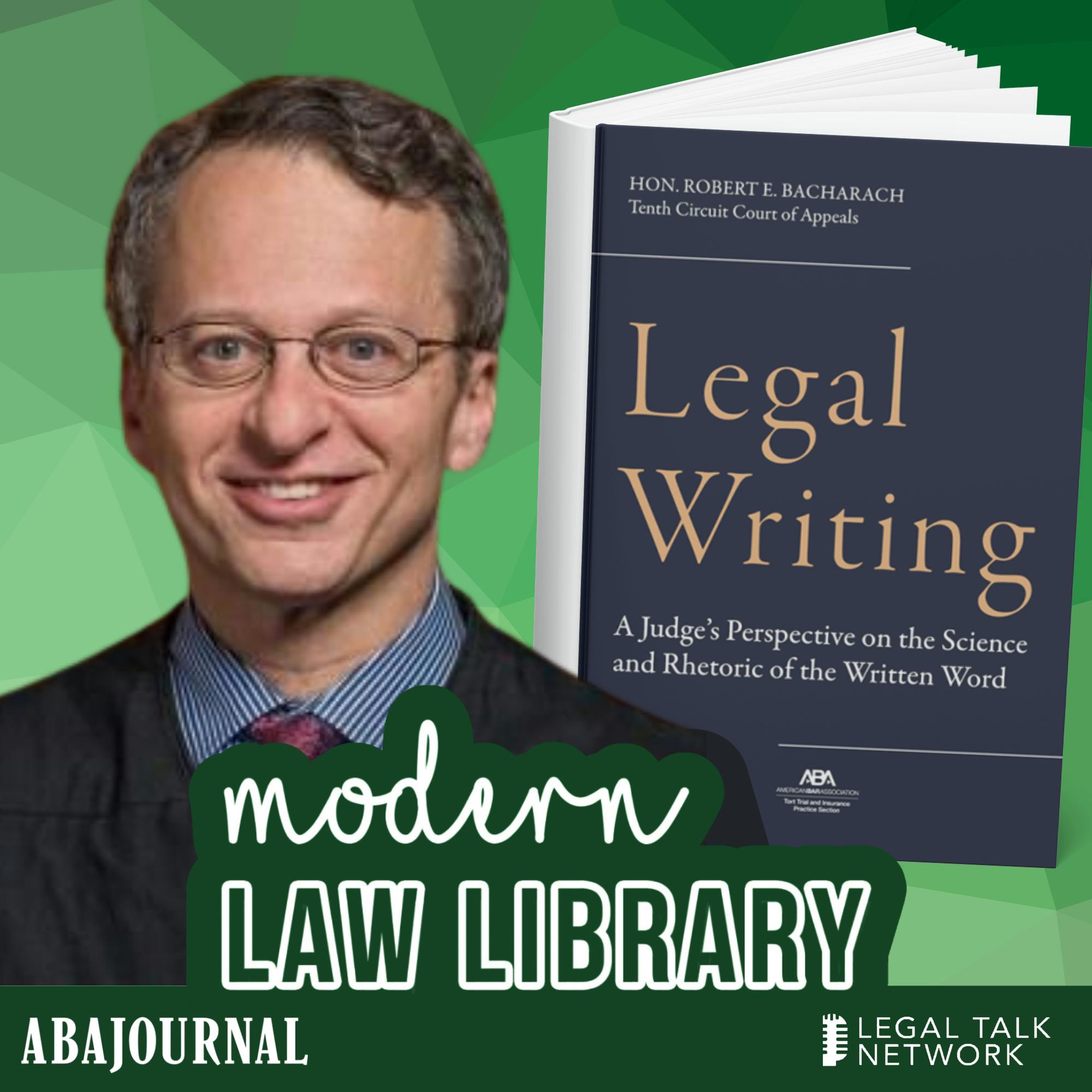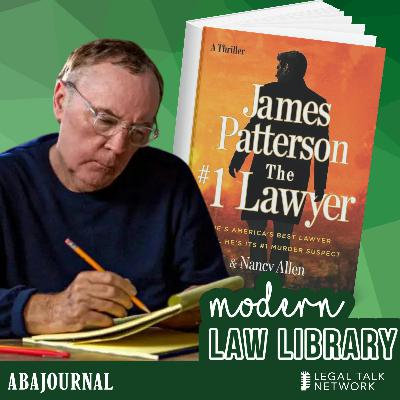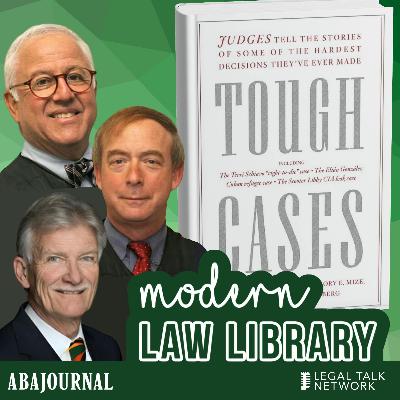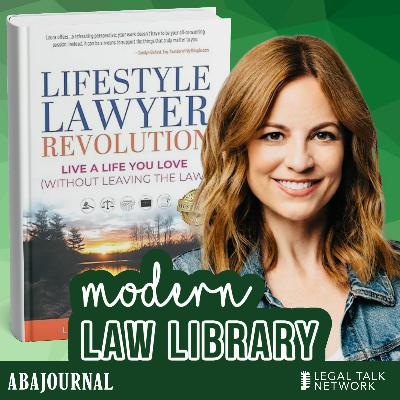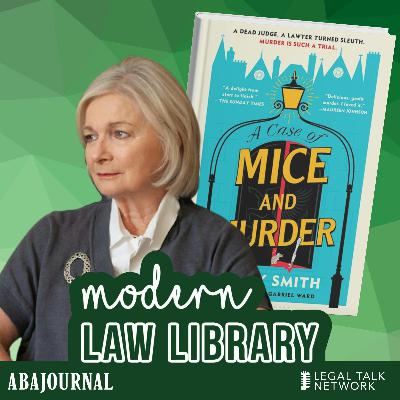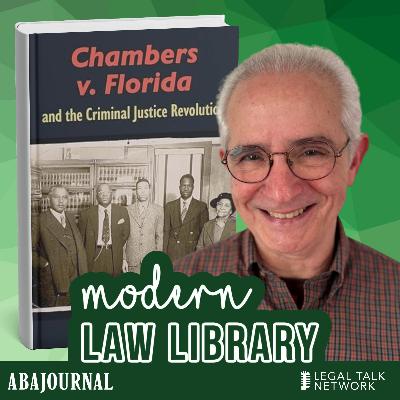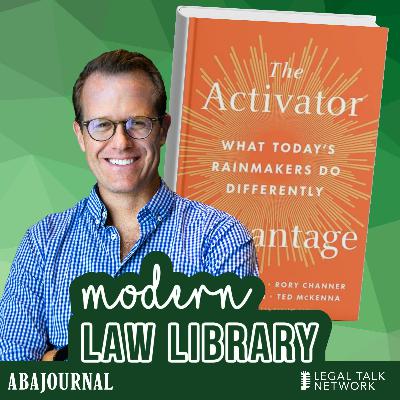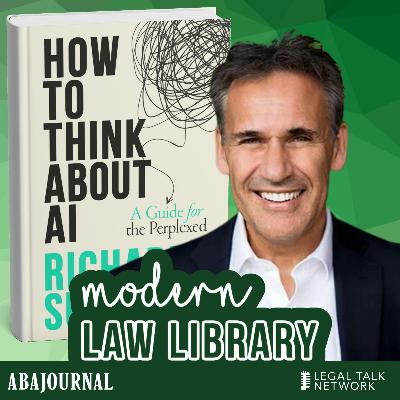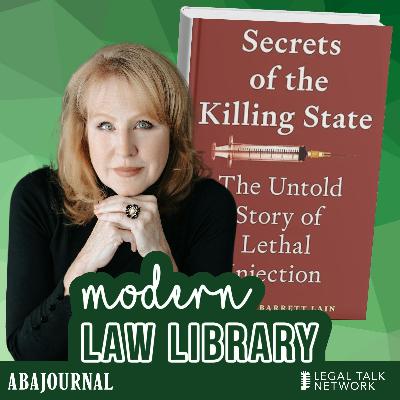Discover Modern Law Library
Modern Law Library

Modern Law Library
Author: Legal Talk Network
Subscribed: 257Played: 4,509Subscribe
Share
Description
Discover books and stories that explore the law in new and surprising ways through eye-opening conversations with their authors. Whether it’s fiction or non-fiction that you seek, Modern Law Library features today’s top legal authors and delves into legal theories, historical events, true crime, and law-inspired storytelling. Join Lee Rawles twice a month as she opens up a new legal publication on Modern Law Library, a Lisagor Award-winning podcast.
255 Episodes
Reverse
A foundational principle of Anglo-American law is that "a man's house is his castle." It establishes rights ranging from privacy to justifiable homicide. But what about when your castle is another person's workplace? What rights do they have?
In Bringing Law Home: Gender, Race and Household Labor Rights, Katherine Eva Maich examines the history of labor protections for nannies, housecleaners and other household employees, and compares how domestic workers fare under the laws in New York City and Lima, Peru.
In this episode, Maich and the Modern Law Library's host Lee Rawles discuss human trafficking, worker rights and responsibilities, the impacts of slavery and colonialism on the Global South, and the real human relationships that develop between employees and employers within the home.
In the movie 1973 film Walking Tall, Sheriff Buford Pusser is a heroic law enforcement officer in small-town Tennessee whose fight against the Dixie Mafia leads to an ambush and shooting that left his beloved wife Pauline dead.
The movie and its sequels and remakes made Pusser, who died in a 1974 car crash, into a folk hero. Dwayne "The Rock" Johnson played him in the 2004 Walking Tall remake. The Pusser legend became a cottage industry for Adamsville, Tennessee, where the Buford Pusser Home and Museum is based.
Mike Elam, a former law enforcement officer, started researching Pusser's life as a hobby back in the 1970s. Once the internet became an avenue for exploration, "I started a social media page and I was very much a fan of Buford Pusser at that time," Pusser tells Modern Law Library host Lee Rawles. "And it was one of those things where I got to researching it and learned far too much for my own liking, because I did not like the man I saw as opposed to the one that was in the movie."
Elam's decades of research and interviews with people who had encountered Pusser led to a book, Buford Pusser: The Other Story. It also led to the Tennessee Bureau of Investigations reopening the case into Pauline Pusser's murder and exhuming her body. In 2025, they announced that the investigation revealed details that pointed to one suspect: Buford Pusser himself.
In this episode, Elam discusses his long investigation, tips for other true crime citizen detectives, what he thinks now about the way Buford Pusser has been memorialized–and how he found the gun that killed Pauline.
The idea that prisoners should be treated humanely was discussed by Enlightenment Era aristocrats, "but the idea that they are people who are peers is new," says Yale Law professor Judith Resnik.
"As Democratic norms turned us all into equal citizens, equal persons in a jurisdiction, the question of government's relationships in courts, policing, schools and prisons changed over the last hundred years," says Resnik, author of Impermissible Punishments: How Prison Became a Problem for Democracy.
In this episode of the Modern Law Library, Resnik walks host Lee Rawles through centuries of discussion about how punishments are deemed to be permissible, from a trial about whipping prisoners in Arkansas to the League of Nations' effort to develop minimum standards of treatment in prisons worldwide.
"People who run prisons have a very challenging time, and there's a body of data growing that people who work in prisons, like people who live in them, have higher stress, heart attacks, blood pressure, suicide rates," Resnik tells Rawles. "These are terrible environments of concrete and metal and noise and often dirt and violence. In the United States, many people who are in detention have had mental health issues and behavioral issues of significant kinds. And when you take people with limited training, often with staffs that are too thin, interacting with overcrowded facilities of metal and concrete, with limited resources, you end up generating scary places for everybody.
"So one of the kind of puzzles, if you step back, is how a thing called corrections, that promises safety, has generated institutions that are deeply unsafe for the people who live and work in them."
Looking for something to occupy yourself over the holidays, or to kick off your 2026? Lee Rawles is joined by her fellow Legal Talk Network hosts Stephanie Everett of the Lawyerist podcast and Conrad Saam and Gyi Tsakalakis of Lunch Hour Legal Marketing to share what books, TV shows and movies they enjoyed this year. They also share some of their own resolutions for 2026–and reveal a special new project for the Modern Law Library, coming soon to your podcast feed.
December 8th marks the 45th anniversary of John Lennon's death in 1980. In this special rebroadcast of Modern Law Library, we're looking back at how his immigration helped expose corruption within the Nixon administration and rewrote the immigration process. His attorney, Leon Wildes, sat down with Lee Rawles and his son Michael Wildes to discuss what the case and the legal legacy Lennon left behind.
-----
When immigration attorney Leon Wildes got a call from an old law school classmate in January 1972 about representing a musician and his wife who were facing deportation, their names didn’t ring a bell. Even after meeting with them privately at their New York City apartment, Wildes wasn’t entirely clear about who his potential clients were. He told his wife that he’d met with a Jack Lemon and Yoko Moto.
“Wait a minute, Leon,” his wife Ruth said to him. “Do you mean John Lennon and Yoko Ono?”
What Wildes didn’t know when accepting the Lennons’ case was that he and his clients were facing a five-year legal battle which would eventually expose corruption at the highest levels of the Nixon administration and change the U.S. immigration process forever. His account of that legal battle is told in “John Lennon vs. the USA: The Inside Story of the Most Bitterly Contested and Influential Deportation Case in United States History.”
Leon Wildes and his son Michael (now a managing partner at the firm his father founded, Wildes & Weinberg) joined the ABA Journal’s Lee Rawles to discuss the legacy of the case and the effect it’s had on the entire family.
Mentioned in This Episode:
John Lennon vs. The U.S.A.: The Inside Story of the Most Bitterly Contested and Influential Deportation Case in United States History
If you’re dreading your family’s lack of communication this Thanksgiving, here’s a conversation about another group that’s saying less and less with real consequences. In this rebroadcast, University of Texas law professor Stephen Vladeck joins The Modern Law Library to discuss The Shadow Docket and how the Supreme Court’s growing use of secretive, unsigned emergency orders is reshaping transparency, civic discourse, and public trust in the rule of law.
-----
In The Shadow Docket: How the Supreme Court Uses Stealth Rulings to Amass Power and Undermine the Republic, University of Texas law professor Stephen Vladeck argues the U.S. Supreme Court is expanding its powers at the expense of the rule of law and public transparency.
A case ordinarily comes before the U.S. Supreme Court after a long appellate process; receives a public hearing where the case is argued before the justices; then a signed opinion or series of opinions and a majority ruling are issued, which generally comes months after oral arguments—and years after a matter first entered the court system. Given the limited length of each Supreme Court term, there has always been the need for an alternative form of response when the court is not in session or a swift response was absolutely necessary. The vast bulk of those occasions have been in capital cases, where a last-minute appeal might be the difference between life and death.
But since 2017, the U.S. Supreme Court has issued many more emergency orders than at any time previously, and on matters ranging from election law to immigration bans, from abortion access to COVID-19 restrictions on public gatherings.
By issuing unsigned majority emergency orders rather than signed majority opinions, Vladeck says the court is establishing precedents without supplying the legal reasonings behind its rulings. During a time when the U.S. Supreme Court and individual justices are being criticized for not abiding by a clear judicial code of ethics, Vladeck argues the secretive nature of the shadow docket will only further undermine public trust in the rule of law.
In this episode of the Modern Law Library, Vladeck discusses with the ABA Journal’s Lee Rawles the origin of the term “shadow docket,” the dangers he sees for the court and the country, and what remedies may be available to the republic.
It’s election week in the U.S., and while many eyes are on the polls, we’re revisiting a conversation that reminds us why voting matters in the first place. In this rebroadcast, Yale Law professor Owen Fiss reflects on his work enforcing the Civil Rights and Voting Rights Acts, the courts’ role in protecting democracy, and why casting a ballot remains both a privilege and a duty.
-----
After 50 years as a professor at Yale Law School, Owen Fiss says his students are still idealistic and passionate about the rights won in the Civil Rights Act of 1964 and Voting Rights Act of 1965. As a young lawyer in the late 1960s, Fiss worked with the Department of Justice to implement those laws. A classroom discussion in the spring of 2020 prompted him to draw upon his legal expertise and decades of experience to produce his new book, Why We Vote.
In this episode of The Modern Law Library podcast, Fiss speaks with the ABA Journal’s Lee Rawles about the paradox of the court system–the least democratic branch of government–having the responsibility of safeguarding the right to vote. He looks back on his work with the DOJ in southern states, and his time as a clerk for Justice Thurgood Marshall (then on the 2nd U.S. Circuit Court of Appeals in New York) and Justice William Brennan.
Rawles and Fiss also discuss recent threats to the electoral system and right to vote, including the insurrection on Jan. 6, 2021. Fiss shares his thoughts about Section 3 of the 14th Amendment, and whether former President Donald Trump should be removed from the ballot on that basis.
While every book he writes is for his students, Fiss says, he hopes Why We Vote can impress upon a broader audience the privilege and duty of voting and participating in a democracy.
As Halloween swiftly approaches, we’ve conjured up a classic from the Modern Law Library crypt. What do zombies and pirates have to do with the law? Grab your candy and find out as host Lee Rawles is joined by Paul Golden, author of Litigating Adverse Possession Cases: Pirates v. Zombies.
—----
“Trespassing plus time equals adverse possession,” Paul Golden writes in his new book, Litigating Adverse Possession Cases: Pirates v. Zombies. When someone has occupied or used a piece of property as though they own it for long enough, a court could determine that they are the rightful owner—regardless of what the paperwork says. It’s a concept more popularly discussed as squatter’s rights.
In this episode of The Modern Law Library, Golden speaks with the ABA Journal’s Lee Rawles about the ancient concepts underlying modern adverse possession law; some quirky state laws; and why societies would allow land to be transferred in this way. They also discuss how the plain meaning of terms like “hostile” are changed when used in adverse possession cases, and Rawles raises a hypothetical—taken from real life—of a neighbor’s crooked fence.
During Golden’s first appearance on The Modern Law Library, he explained how the lack of a written contract could be navigated by a savvy lawyer. In his new book, Golden guides attorneys and their clients through the finer points of arguing for and against adverse possession claims. He shares some of the errors he’s seen pop up in adverse possession cases, and offers advice for how to avoid common pitfalls.
As the Supreme Court returns to the bench, we’re raising a glass to a favorite from our archives. In this episode, Nancy Maveety shares stories from Glass and Gavel, where cocktails meet constitutional law.
-----
From the earliest days of the U.S. Supreme Court, alcohol has been part of the work lives and social lives of the justices. In the book “Glass and Gavel: The U.S. Supreme Court and Alcohol,” Nancy Maveety takes readers on a tour through the ways that SCOTUS and spirits have overlapped. In this episode of the Modern Law Library, she speaks with the ABA Journal’s Lee Rawles about how she came to write this in-depth history. While the Prohibition Era would immediately spring to mind, the court faced a number of cases involving alcohol that impacted commerce, advertising, criminal justice and even gender discrimination laws. Maveety, who in addition to being a scholar of constitutional law also studies mixology, shares how she selected a signature cocktail for each chief justice’s tenure. She also has a drink suggestion for readers which incorporates an ingredient that’s known to be one of Justice Ginsburg’s favorites–and a cautionary tale about a normally teetotaling chief justice who dropped dead after sipping a sherry.
As Native American Day approaches on September 25, we’re revisiting a story that still resonates today. Author David Grann takes us inside the Osage murders—a chilling chapter in U.S. history where oil wealth brought tragedy, corruption, and the rise of the FBI.
-----
Although the Osage tribe had been forced from their ancestral lands by the U.S. government, through shrewd and careful bargaining they retained the mineral rights to one of the richest oil fields in the world: Osage County, Oklahoma. But instead of insuring the prosperity and safety of the tribe, the wealth of the Osage made them targets for what was later known as the Reign of Terror. The task of solving dozens of murders fell in the 1920s to the newly formed FBI and its young director, J. Edgar Hoover. In this episode of the Modern Law Library, author David Grann tells the ABA Journal’s Lee Rawles how he first learned of this series of murders and decided to write Killers of the Flower Moon: The Osage Murders and the Birth of the FBI. He also discusses the brave Osage woman at the heart of his story, Mollie Burkhart, who defied the local white-dominated power structure to discover who was responsible for the deaths of her family members.
Mentioned in This Episode:
Killers of the Flower Moon: The Osage Murders and the Birth of the FBI by David Grann
As summer winds down and school beckons, we’re looking back in our archives and assigning some back-to-school reading—grown-up style. In this episode, Professor Kathryne M. Young shares advice from her book How to Be Sort of Happy in Law School—from tackling imposter syndrome to finding your own path through law school’s pressures.
—--
Law school can be a lonely, stressful time, and it’s easy to feel like you’re failing to fit the model of the perfect law student. But there’s no one right way to go to law school, says Professor Kathryne M. Young, author of How to Be Sort of Happy in Law School; you can craft your own experience. In this episode of the Modern Law Library, Young talks with the ABA Journal’s Lee Rawles about tackling imposter syndrome; advice that alumni wish they could give their younger selves; and techniques for getting along with your fellow students. Young uses lessons from her own law school experience and a sociological study she conducted to give practical tips for keeping a mental balance; choosing which courses and activities to pursue; managing the practical aspects of your household and budget; forming relationships with mentors and peers–and even deciding when if it’s time to leave law school altogether. Young’s book offers a holistic approach to surviving–and thriving–under the social, academic and economic pressures of law school.
As summer winds down and school beckons, we’re looking back in our archives and assigning some back-to-school reading—grown-up style. In this episode, Judge Robert Bacharach shares insights from his book on the science of persuasive legal writing and why judges love to talk about language.
—--
There’s plenty of conventional wisdom about what makes a good legal brief or court opinion. Judge Robert E. Bacharach of the Denver-based 10th Circuit Court of Appeals says that when judges socialize, their conversations often devolve into discussions about language and pieces of writing they enjoy or revile.
But Bacharach decided he wanted to dive deeper, to see what the science of psycholinguistics could teach lawyers and judges about how written words persuade an audience. The result was his new book, Legal Writing: A Judge’s Perspective on the Science and Rhetoric of the Written Word, published by the ABA.
Legal Writing is a slim volume, but it’s packed with tips. It considers details as microscopic as a serif on a letter and as macroscopic as how to create an outline for an argument. In this episode of the Modern Law Library podcast, Bacharach chats about his own writing process; shares his top takeaways from the psycholinguists he consulted; and offers his advice for young litigators looking to hone their skills.
With a new legal thriller on the horizon, we're revisiting James Patterson’s 2024 interview about #1 Lawyer. The bestselling author shares how he builds courtroom suspense and what makes a legal story truly gripping.
—--
James Patterson has written bestsellers in many genres. But as he tells the ABA Journal’s Lee Rawles in this episode of The Modern Law Library, he has always been fascinated by legal thrillers, courtroom dramas and crime novels. He even considered becoming a lawyer, before his literary career took off.
In his newest release, The #1 Lawyer, James Patterson partnered with co-author Nancy Allen to tell the story of Stafford Lee Penney, a criminal defense attorney in Biloxi, Mississippi, who’s never lost a case. But after handing a high-profile murder trial involving the son of a mobster, Penney finds himself on the other side of the bench as a defendant himself, charged with murdering his own wife.
Patterson has written and co-written more than 300 books, including bestselling series like Alex Cross, Women’s Murder Club and Maximum Ride. He had some writing tips for attorneys, particularly on how to work collaboratively. As Patterson tells listeners in the podcast, he is open about working with other writers on many of his books, and he finds tools like outlining absolutely essential. He also shares with Rawles how he thinks co-writers should handle interpersonal communication while working together.
Patterson says one of the major benefits of working with co-authors is pulling from their experiences to make his books more accurate and true to life. When he wrote The President is Missing with Bill Clinton, the former president could tell Patterson the inside details of how a Secret Service detail worked. When he wrote Run, Rose, Run with Dolly Parton, she walked him through the production cycle for a song.
Allen, who conducted more than 30 jury trials as a prosecutor in Missouri and taught law for 15 years at Missouri State University, contributed her firsthand courtroom experience to The #1 Lawyer. Patterson says they worked to make everything as accurate as possible—while still allowing for a good story. It’s the pair’s second book together, following a previous standalone novel, Juror #3.
In this episode of The Modern Law Library, Patterson shares some of his favorite law-related pop culture picks; news about new and ongoing projects; and describes a very special birthday event with Dolly Parton. He also discusses how his children’s series Maximum Ride got caught up in Florida book bans in 2023. For fans of Patterson’s breakout success, the Alex Cross series launched in 1993 with Along Came a Spider, the author shares updates about what’s next for the intrepid detective—including details about the upcoming Amazon Prime TV series Cross, starring Aldis Hodge.
This month, we're revisiting some standout conversations from our archives. In this episode, three seasoned trial court judges reflect on the cases that have stayed with them throughout their years on the bench.
-----
All judges have cases that stick with them and linger in their memories. Sometimes it was because of the high profile of the case, and sometimes an obscure case had personal resonance because of the people or issues involved. In this episode of the Modern Law Library, the ABA Journal’s Lee Rawles speaks with Judges Russell F. Canan, Gregory E. Mize and Frederick H. Weisberg, who all sit on the Superior Court of the District of Columbia. The three judges were contributors to and the editors of “Tough Cases: Judges Tell the Stories of Some of the Hardest Decisions They’ve Ever Made.” Canan, Mize and Weisberg share their own stories, including why Canan’s well-meant gesture to avert an injustice in a gun case still troubles him. Mize explains why a child-custody case haunted him for decades, and what happened when he tracked down the now-grown child as he was deciding whether to write about it for “Tough Cases.” Weisberg talks about dealing with the emotional fallout from overseeing a case where a mother had murdered her four children.
Laura Cowan started her career in finance, earning a CPA and working at Ernst & Young and Goldman Sachs. When she decided to go to law school at 35, she knew that she wanted to launch a boutique firm with a practice area that complemented that financial background. Estate law seemed a good fit—but fate threw her a curve ball just as she launched her firm.“I had to turn my entire practice virtual overnight in 2020 in New York City because of COVID,” Cowan tells the ABA Journal’s Lee Rawles in this episode of the Modern Law Library. “I moved to Rhode Island to shelter in place with my dad. During that couple of months that I was sheltering in place, I still had to get my law firm running. I had a business to run and bills to pay. So I made everything virtual, and I really streamlined everything. And what I found was that I could make pretty easily $10,000 a month, working just a couple of hours a day.”
She has now leveraged the experience of launching an all-virtual estate-planning practice into a coaching program, 2-Hour Lifestyle Lawyer, to help other lawyers launch similar practices. Her new book, Lifestyle Lawyer Revolution: Live a Life You Love (Without Leaving the Law), is full of tips and advice for building a personalized practice to provide work-life balance for attorneys.
“Now, what we found is that there’s a lot of lawyers who are happy working a lot more than that and are happy earning a lot more, but the name of the business really comes from just this idea that you can still be a really great attorney without working 10 hours a day, and you can make a nice living without working 10 hours a day,” says Cowan.
A key part of not working too many hours is to hire appropriate assistance, even as a solo just starting out, says Cowan.
“What I see a lot of is lawyers that spend too much time in the weeds of executing and doing all these different things that an admin could be doing, and not spending enough time doing what the lawyer should be focusing on,” says Cowan. “So they’re both working too much and not making enough money, which is the worst possible combination.”
Cowan encourages estate attorneys to hold community workshops to help people understand the importance of wills and trusts. She says it’s an excellent way to establish connections that can lead to further business.
“The real reason that people hire us is because of the connection,” Cowan tells Rawles. “And I firmly believe this. People don’t hire you because you’re the best drafter in the world. They hire you because of the way that you make them feel. So use AI and technology behind the scenes to help you get your work done and deliver a really great client experience, but never forget that it’s going to be that that makes them hire you.”
In this episode, Cowan also discusses the benefits of value-based pricing versus the billable hour; attracting the client base you want to target; and how to deal with your biggest frenemy: technology.
Since it was seized from the Knights Templar in the 14th century, the Inner Temple in London has housed acolytes of a different sort: men (and eventually women) who serve as advocates of the law. Sally Smith spent her legal career—and now is spending her retirement—inside the 15 acres that comprise the Inner Temple, now one of the four Inns of Court. Smith has previously written non-fiction books about historical crimes and legal figures. When she decided to turn her hand to writing fiction, the familiar setting of the Inner Temple was the perfect setting for her new mystery novel, A Case of Mice and Men. Set in 1901, mere months after the death of Queen Victoria, A Case of Mice and Men introduces a new (and very reluctant) sleuth to the literary scene. Sir Gabriel Ward KC is happiest either when holed up in his Inner Temple lodgings with his books, or when making a compelling case in front of the High Court judges. A solitary, particular and cerebral man, Ward is not looking for excitement beyond the intellectual. But he finds it early one morning when he trips over the body of the Lord Chief Justice of England, which has been left on the doorstep of his professional chambers. The ancient privileges afforded to the Inner Temple mean that no policeman is allowed to enter without permission, and an aghast Ward is told he will conduct the investigation himself or be at risk of being kicked out of his lodgings. Unused to the world outside the Temple walls, or of conversing with any women apart from his old nanny or his mother, Ward must stretch himself to discover who killed Lord Norman Dunning. All the while, Ward is also wrestling with a knotty legal issue involving the rights to a bestselling children’s book, and will need to exercise all his skills on behalf of his client, the publisher of Millie the Temple Church Mouse. Written by a mysterious author, the book has been a runaway success, bringing throngs of children to the Temple Church and spawning toys, games and an American publishing deal. Now that the author has reportedly surfaced and is demanding her share of the money and control of the intellectual property, what will happen to Millie the Temple Church Mouse? In this episode of the Modern Law Library, Smith and the ABA Journal’s Lee Rawles discuss the launch of this new series, which will contain at least three books following Ward’s adventures. Smith describes her own career as a barrister, and why she chose to set the series at the beginning of the Edwardian era. She also discusses the issues of class, gender and the complex world within the walls of the Inner Temple.
In Chambers v. Florida and the Criminal Justice Revolution, historian and former ABA Journal reporter Richard Brust lifts the veil on a case that laid the groundwork for some much more famous civil rights victories. On May 13, 1933, shopkeeper Robert Darsey was robbed and murdered in Pompano, Florida. Four Black migrant farm workers—Izell Chambers, Walter Woodard, Jack Williamson and Charlie Davis—were seized and pressured by the local sheriff into confessing to the murder under threat of lynching. Their appeals eventually reached the U.S. Supreme Court through the efforts of some dedicated African American attorneys, and succeeded in 1940. In Justice Hugo Black’s written opinion for the majority, the justice drew parallels between the Jim Crow regime in the American South and the rise of authoritarianism and fascism in Europe. Chambers v. Florida forbade the use of psychological coercion—such as threatening to turn prisoners over to lynch mobs—as well as physical abuse to extract confessions. The court’s ruling declared that the protections of the Bill of Rights extended into states’ criminal cases, and began to change the kinds of cases that made it onto the Supreme Court docket.Brust sees it as part of a trio of cases, which includes Moore v. Dempsey (1923) and Brown v. Mississippi (1936), that led to a “criminal procedure revolution,” he tells the ABA Journal’s Lee Rawles. In this episode of The Modern Law Library, Brust discusses the lawyers who worked on the case, most prominently Simuel D. McGill, a Black attorney in Jacksonville. He delves into the generational differences between the Floridian defense lawyers and the attorneys of the NAACP’s Legal Defense Fund who would go on to win key civil rights battles. He explains why Justice Black would have been considered an unlikely author for this opinion. And he shares what he could discover about the fates of Chambers, Woodard, Williamson and Davis after the trial.
Matthew Dixon, co-founder of DCM Insights, is a researcher who’s spent much of his career studying the shared characteristics and behaviors of successful B2B salespeople. In 2011, he released a study called “The Challenger Sale.” While giving a keynote on his findings at an annual partner retreat, an audience member stood up and challenged him.
“He said, ‘Dr. Dixon, you’ve been talking for 45 minutes about sales effectiveness and salespeople and selling and sales process, and it’s all very fascinating and I’m sure our clients would be very interested in this,’” Dixon recounts to the ABA Journal’s Lee Rawles in this episode of The Modern Law Library. “‘And after all, we do a lot of consulting around go-to-market strategy. But what maybe you don’t recognize is that we are partners at our firm. We are not salespeople. In fact, there’s not a single salesperson in this audience. I might go so far as to say we don’t sell anything here.’”
Dixon was taken aback. “What I realized was this world of partnerships, of professional services, of doer-sellers is actually quite a bit different from the world of sales and what we had written and all this research we’d done over the years.”
In 2022, he tackled this population with the Rainmaker Genome Project, a study that became the basis for The Activator Advantage: What Today’s Rainmakers Do Differently, co-written by Dixon, Rory Channer, Karen Freeman and Ted McKenna.
The Rainmaker Genome Project surveyed 3,000 partner-level professionals in 41 firms across law, public relations, accounting and investment banking. About 39% of respondents were lawyers. Each received a score for effectiveness in business development and were analyzed for how they provided client services. And it turns out that partner was correct: What makes a lawyer an effective rainmaker is not necessarily what makes a salesperson effective.
After doing a vector analysis on the data, “what we found was that every one of those 3,000 professionals could be placed into one of five business development profiles,” says Dixon. The five profiles were the expert, the confidant, the debater, the challenger and the activator.
Dixon stresses that the five categories are not about personality. While personalities are immutable, behaviors can be changed.
“These are about the things we can all learn to be better at,” says Dixon. “It’s about how we spend our time, how we engage clients, how we use resources, how we collaborate with colleagues—and those are things we can all get better at with the right training, coaching and support from our firms.”
In this episode, Dixon expands on each type, but the most effective performers in business development were the activators.
“The reason we chose the term ‘activator’ instead of ‘connector’—people have asked—is that they’re not about collecting business cards and letting them collect dust or just hoarding LinkedIn connections,” Dixon tells Rawles. “What these folks do is try to turn these relationships into paying client relationships. They activate those relationships by proactively bringing new ideas—ways to mitigate risk, make money, save money—to clients.”
Dixon offers practical advice on how to behave like an activator, including the most effective ways to use LinkedIn. Lawyers and other client-servicing professionals can’t just sit back and wait for business to find them, he warns.
“Whether we like to admit it or not, clients are less loyal today than they once were,” he says. “They’re less likely to come back automatically to their incumbent provider. No matter how great the relationship or the value you’ve delivered, they’re forcing us to compete in ways we didn’t have to in the past. So activators want a backup plan. They know today’s great client might not be a client tomorrow, no matter what you’ve done. So you need a backup plan.”
For nearly 30 years, Richard Susskind has written books asking lawyers to envision the future of the law and the legal profession in ways that stretch the imagination. Susskind has been one of the foremost proponents of the transformative potential of technology in legal services. Now, he's asking us to imagine larger transformation still: a world in which AI reigns and humanity faces being sidelined.
Susskind was an early and enthusiastic booster of the development of artificial intelligence, he tells the ABA Journal's Lee Rawles in this episode of the Modern Law Library. He first became enamored of its potential as a law student in the 1980s, and wrote his doctorate at the University of Oxford on AI and the law in 1986. But the speed and direction of recent advances have given him pause. Will AI be a tool for humanity, or its destruction?
In his new book, How to Think About AI: A Guide for the Perplexed, he hopes to help the layperson navigate the issues raised by artificial intelligence, and provoke a global discussion about the ethical and legal implications. Technology is too important to be left only to the technologists, he says.
While most people are able to see the promise of AI for professions other than their own, Susskind sees a phenomenon he calls "not-us thinking" when most people are asked if their own work could be taken over by an AI system. Lawyers should be careful not to overestimate clients' attachment to having a human lawyer if their goal is simply to avoid legal pitfalls and they can rely on an AI system to accomplish that.
In this episode, Susskind discusses the promise of AI for increasing access to justice, and talks about some of the ethical decisions that will have to be made with Rawles, who is more of an AI skeptic.
Execution by lethal injection is seen by many Americans as a less barbaric alternative than older methods like hanging, firing squads and electrocution. It is easy to assume that the process must resemble euthanasia procedures for terminally ill people or pets. The reality is very different, says Corinna Barrett Lain, a law professor and death penalty expert.
Lain didn’t initially intend to make the death penalty her primary area of study, she tells the ABA Journal’s Lee Rawles in this episode of the Modern Law Library. A former prosecutor in Virginia, Lain did not begin her work out of opposition to the death penalty. But the more she discovered about the realities of the administration of lethal injections, the more she was compelled to demystify the process.
In Secrets of the Killing State: The Untold Story of Lethal Injection, Lain upends a lot of conventional wisdom about lethal injections. For example, the three-drug protocol used by most states was not a drug cocktail arrived at through scientific research. Rather, in 1977, after the U.S. Supreme Court allowed executions to resume after a 10-year hiatus, Oklahoma medical examiner Dr. Jay Chapman was asked by a state legislator to come up with an alternative to the state’s rickety electric chair. Though Chapman admitted he was “an expert in dead bodies but not an expert in getting them that way,” he proposed combining sodium thiopental, pancuronium bromide and potassium chloride. “You wanted to make sure the prisoner was dead at the end, so why not add a third drug,” the book quotes Chapman as saying. “Why does it matter why I chose it?” In contrast, an overdose of a single drug, pentobarbital, is what is commonly used by veterinarians in animal euthanasia.
“Lethal injection is not based on science,” Lain writes. “It is based on the illusion of science, the assumption of science.”
In this episode, Lain and Rawles also discuss botched executions, shady sources used by states to procure the drugs used for lethal injections, and how Lain’s scholarship has impacted her views of capital punishment as a whole.



